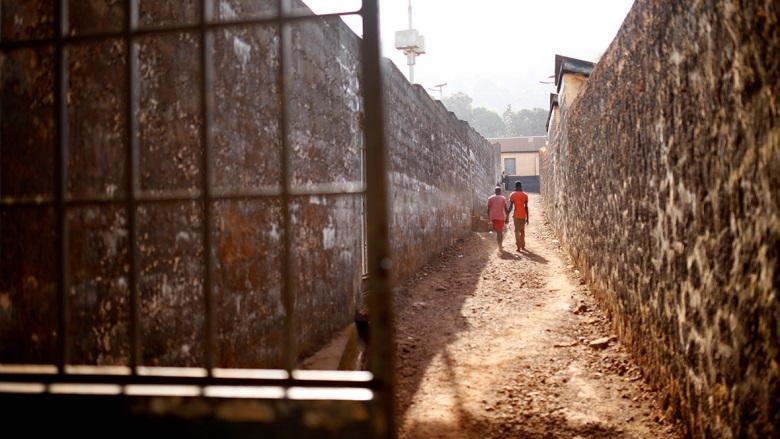By Melanie Mayhew, Communications Officer
She raced out of the white tent, her family cheering and clapping wildly when they saw her coming. They embraced her, broke into song and praised God for sparing her life when so many others had lost theirs. As she climbed into the car to begin her journey home, they asked her what she would do next, now that she had survived Ebola.
“I will live to treat my patients,” she said.
Just weeks later, Klubo Mulbah, 44, with eyesight weakened by Ebola and persistent numbness and joint pain in her legs, returned to Grant Mental Health Hospital in Monrovia, Liberia, where she works as a physician assistant and mental health clinician.
Her patients, many of them living with schizophrenia and substance abuse disorders, “started rejoicing and dancing” when they saw her walk through the hospital’s gate, she said. Her patients and their families had repeatedly called her while she was in the treatment center and had visited her at home while she was recovering. Through it all, she had treated her patients over the phone, even while fighting a virus that has killed nearly 5,000 Liberians in the past two years.
In a country of 4 million people, Klubo is just one of about 160 health workers who have received any mental health training. She works at the only mental health hospital in the country, which has 71 beds and one psychiatrist, the only one in Liberia.
Close to 10% of the world’s population lives with mental illness, and WHO estimates that, during emergencies, as many as one in five people is affected by depression and anxiety. Although no recent statistics exist, a 2008 study—five years after Liberia’s civil war ended—found that 40 percent of Liberians had symptoms of major depression and 44 percent appeared to have post-traumatic stress disorder. Because of the dearth of mental health services in the country, few received treatment.
Then just 10 years later, the Ebola outbreak hit Guinea, Liberia and Sierra Leone, infecting more than 28,600 people and killing more than 11,300. The epidemic, which has continued to flare up, shattered the countries’ fragile health systems, closed schools, drove farmers from their fields, shuttered businesses and sent the countries’ economies into a tailspin.
Ebola also has deeply affected people’s mental health. When national statistics are available, the countries’ mental health experts expect that they will show that many, many thousands of people in Liberia and Sierra Leone need mental health treatment after surviving Ebola, losing relatives and friends to Ebola, helping the victims of Ebola, or simply living in the countries during this traumatic time. For example, of 233 Ebola burial team workers, ambulance drivers and contact tracers who participated in a Carter Center training in Liberia, 40 percent needed treatment for alcohol abuse.
Ebola crisis increases nations’ mental health issues
Mariatu, 46, an Ebola survivor living in Rokupa, Sierra Leone, cries almost every day. She lost 10 family members to Ebola, including seven children and her husband. Mired in depression, she said she has thought about taking her own life. Her life—marked by violence and war, poverty, and Ebola—has been difficult. During the civil war, the rebels chopped off one of her husband’s arms. The family fled to Freetown. A dozen years later, their neighborhood became an Ebola hotspot.
“Ebola was more devastating for us than what happened during the war,” she said.
Her 13-year-old daughter, Adama, also an Ebola survivor, comforts Mariatu when she cries.
Sierra Leone, with a population of 6 million, has only one psychiatrist in the country. Almost all Sierra Leoneans with mental health disorders do not have access to mental health services, said Dr. Andrew Muana, a physician specialist and lead in mental health, who runs Sierra Leone Psychiatric Hospital, a 97-bed facility and the only mental health hospital in Sierra Leone.
After Sierra Leone’s civil war ended in 2002, a survey found that more than 12 percent of people were living with mental health disorders, notably schizophrenia, depression, anxiety and substance abuse. But, Dr. Muana said that the real number is much higher, since those living with mental illness are often hidden by their families or sent to traditional healers. At least 150,000 more people have developed mental illness because of Ebola, Dr. Muana said.
Sierra Leone Psychiatric Hospital has been standing since 1823, said to be the first mental health hospital in Sub-Saharan Africa. During the civil war, most of the buildings were destroyed and some of the patients went to the warfront. Today, the facility is a maze of colonial walls and newer structures.
After undergoing treatment for three months, most patients are ready to be released—but many no longer have a home to return to. Most have been in the facility for between five and 10 years, Dr. Muana said, because their relatives have abandoned them, scared of the stigma that mental illness carries.
Marie, 55, a mother of nine, is one of those patients. She could have left the Freetown facility four years ago but her daughter will not respond to the facility’s phone calls.
“I’m still hopeful that they might come one day,” Marie said of her family.
Every day, at the end of a row of a dozen beds in the women’s ward, she sits and talks with the staff and waits. Even though she longs to return home, she is grateful for the care she is receiving.
“I’m happy when I’m here because it means I’m getting care and treatment,” she said.

